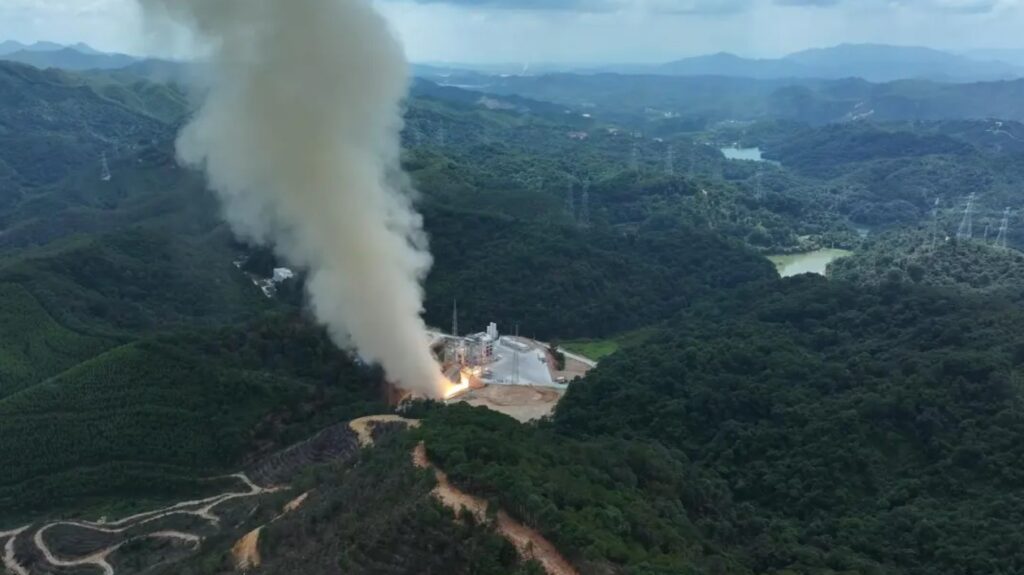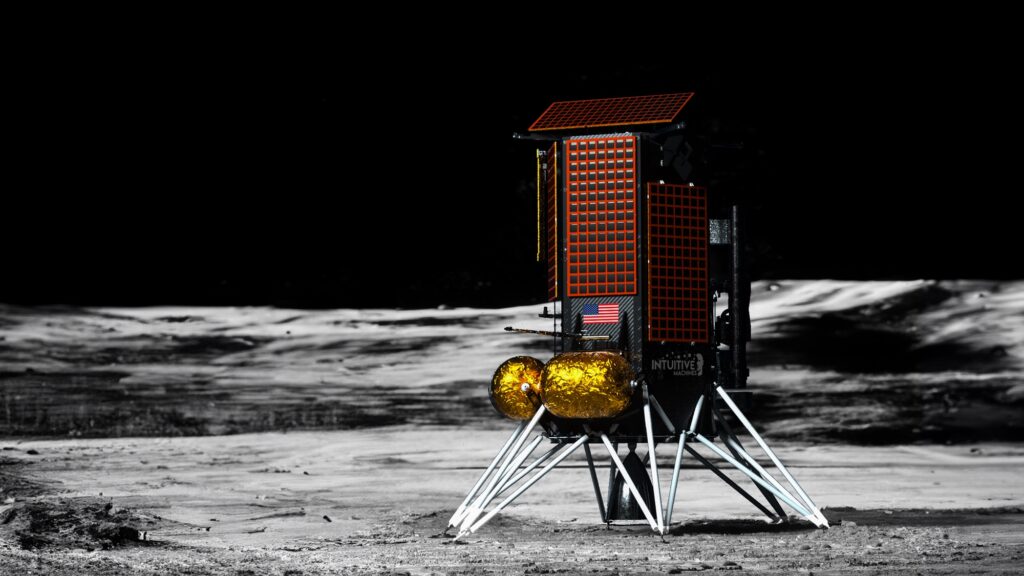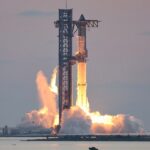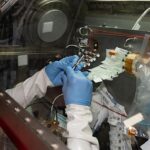Now Reading: Isaacman calls potential NASA science cuts not “optimal”
-
01
Isaacman calls potential NASA science cuts not “optimal”
Isaacman calls potential NASA science cuts not “optimal”
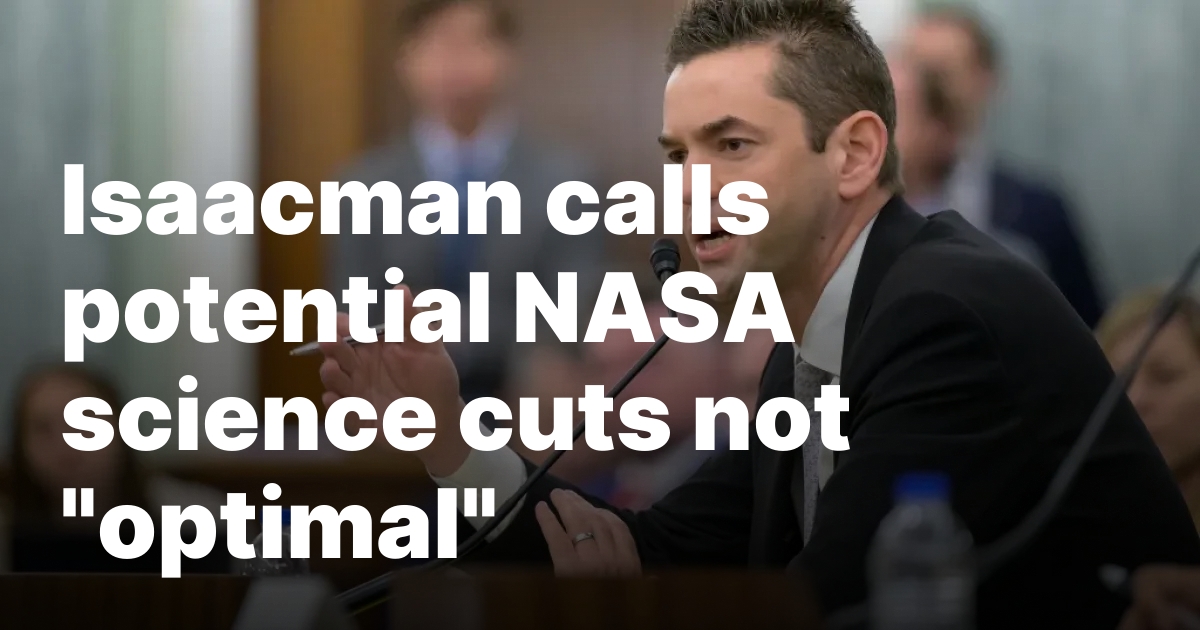
BOSTON — NASA administrator nominee Jared Isaacman says he would, if necessary, prioritize the Artemis lunar exploration campaign over human missions to Mars and calls a potential halving of NASA science funding not “an optimal outcome.”
The Senate Commerce Committee published April 24 responses by Isaacman to questions for the record from Republican and Democratic members of the committee following his April 9 confirmation hearing. The committee is scheduled to vote on reporting Isaacman’s nomination to the full Senate April 30.
One theme in the questions, primarily from Democratic members of the committee, involved reports just after the hearing that the White House is proposing to cut funding to NASA’s science programs by nearly 50% in its fiscal year 2026 budget request. That would include canceling several missions in development, such as the Roman Space Telescope and Mars Sample Return, and likely terminating many ongoing missions in extended operations.
Isaacman said in responses to several questions that he was not involved with the development of the 2026 budget proposal and not aware of its details. “I have not reviewed or been party to any official discussions, but a ~50% reduction to NASA’s science budget does not appear to be an optimal outcome,” he said in response to a question from the committee’s ranking member, Sen. Maria Cantwell (D-Wash.), if he supported such a cut.
“If confirmed, I will advocate for strong investment in space science—across astrophysics, planetary science, Earth science, lunar science, and heliophysics—and for securing as much funding as the government can reasonably allocate,” he wrote, answering another question on science funding from Sen. Brian Schatz (D-Hawaii).
That includes appearing to break with the White House on the future of the Roman Space Telescope. “To my knowledge, the Nancy Grace Roman Space Telescope is nearing completion and remains on schedule and within budget—something that is unfortunately rare for flagship programs at the agency,” he said in response to another question from Schatz. “I’m not aware of any reason why it should be canceled, and I would support its completion and successful deployment.”
Asked by the committee’s chairman, Sen. Ted Cruz (R-Texas), if the Mars Sample Return program should be “outsourced to industry,” citing a proposal to do so from Rocket Lab, Isaacman offered a one-word response: “Yes.”
Getting Artemis “back on track”
A second theme of the questions involved NASA’s Artemis effort and suggestions by Isaacman at the hearing that a human return to the moon could be done in parallel with plans for human missions to Mars. “We could be paralleling these efforts and doing the near-impossible,” he said at the hearing.
Asked by Cantwell which he would choose if there was funding for only the moon or Mars, he picked the moon. “Given existing law, I would prioritize the Artemis program,” he wrote, but continued to argue that doing the moon and Mars in parallel was feasible, without going into detail on how it could be done.
“Historically, NASA managed multiple complex programs simultaneously—Mercury, Gemini, and Apollo—in an era with far less technological capability than we possess today,” he said, not noting the differences in budgets between NASA at the peak of the Apollo program in the mid-1960s and today. “More than six decades later, with the advances in industry and innovation, I believe the world’s premier space agency should be capable of executing multiple major initiatives at a time.”
He reiterated his support for the Space Launch System and Orion as the fastest way to return to the moon, while supporting for a shift to commercial systems once that is done. “Once those obligations have been met,” he said of returning humans to the moon, “I believe NASA should transition away from competing with the commercial sector and instead focus its world-class talent and infrastructure on developing the next generation of exploration technologies—including nuclear spaceships—as a logical next step.”
“If confirmed, I will focus on getting Artemis back on track,” he wrote in an answer to a question from Sen. John Hickenlooper (D-Colo.) about Artemis. “That means working alongside NASA leadership, commercial partners, and program managers to address the root causes of delays— bureaucracy, program misalignment, and lack of accountability—and restoring a mission-first culture across the agency.”
Cruz, in one question, expressed concern “about suggestions that the United States abandon the statutory requirement for NASA to maintain a material presence on or near the Moon.” He asked Isaacman he supported the “sustained human presence” specified by a NASA authorization act in 2010.
“I’m committed to following the law—and as a lifelong space enthusiast, I would like nothing more than to see lunar operations become continuous, enduring, and routine,” Isaacman wrote in response, but called for “flexible policies” to enable that.
Musk ties
A third theme of the questions involved ties between Isaacman and Elon Musk, chief executive of SpaceX who has also been a close adviser to President Trump.
Isaacman said in response to numerous questions he is not close to Musk and does not talk with him often. “I do not have a close personal relationship with Mr. Musk. While I’ve spoken with him occasionally over the years in my capacity as a SpaceX customer, I would describe our interactions as professional,” he said in response to a question from Cantwell. “I admire and respect his contributions to space and technology, but it would be inaccurate to characterize our relationship as close.”
He called “1000% false” a report by the Wall Street Journal in March that claimed that Musk contacted Isaacman late last year to see if he was interested in being NASA administrator, stating that he was contacted by the co-chair of the transition team, Howard Lutnick, about the job. He also denied that he spoke frequently with Michael Altenhofen, a SpaceX official who now serves as a senior adviser at NASA.
Isaacman said he has not spoken with Musk after the election last November on NASA issues. However, in a reprise of an exchange with Sen. Edward Markey (D-Mass.) at the confirmation hearing, Isaacman repeated declined to directly answer if Musk was present when then President-elect Trump offered him the nomination.
“My interview was with the President of the United States,” he wrote in response to three questions from Markey about the meeting. “The person asking me questions—and ultimately offering me the opportunity—was the President himself.”
Stay Informed With the Latest & Most Important News
Previous Post
Next Post
-
 01Two Black Holes Observed Circling Each Other for the First Time
01Two Black Holes Observed Circling Each Other for the First Time -
 02From Polymerization-Enabled Folding and Assembly to Chemical Evolution: Key Processes for Emergence of Functional Polymers in the Origin of Life
02From Polymerization-Enabled Folding and Assembly to Chemical Evolution: Key Processes for Emergence of Functional Polymers in the Origin of Life -
 03Astronomy 101: From the Sun and Moon to Wormholes and Warp Drive, Key Theories, Discoveries, and Facts about the Universe (The Adams 101 Series)
03Astronomy 101: From the Sun and Moon to Wormholes and Warp Drive, Key Theories, Discoveries, and Facts about the Universe (The Adams 101 Series) -
 04True Anomaly hires former York Space executive as chief operating officer
04True Anomaly hires former York Space executive as chief operating officer -
 05Φsat-2 begins science phase for AI Earth images
05Φsat-2 begins science phase for AI Earth images -
 06Hurricane forecasters are losing 3 key satellites ahead of peak storm season − a meteorologist explains why it matters
06Hurricane forecasters are losing 3 key satellites ahead of peak storm season − a meteorologist explains why it matters -
 07Binary star systems are complex astronomical objects − a new AI approach could pin down their properties quickly
07Binary star systems are complex astronomical objects − a new AI approach could pin down their properties quickly












